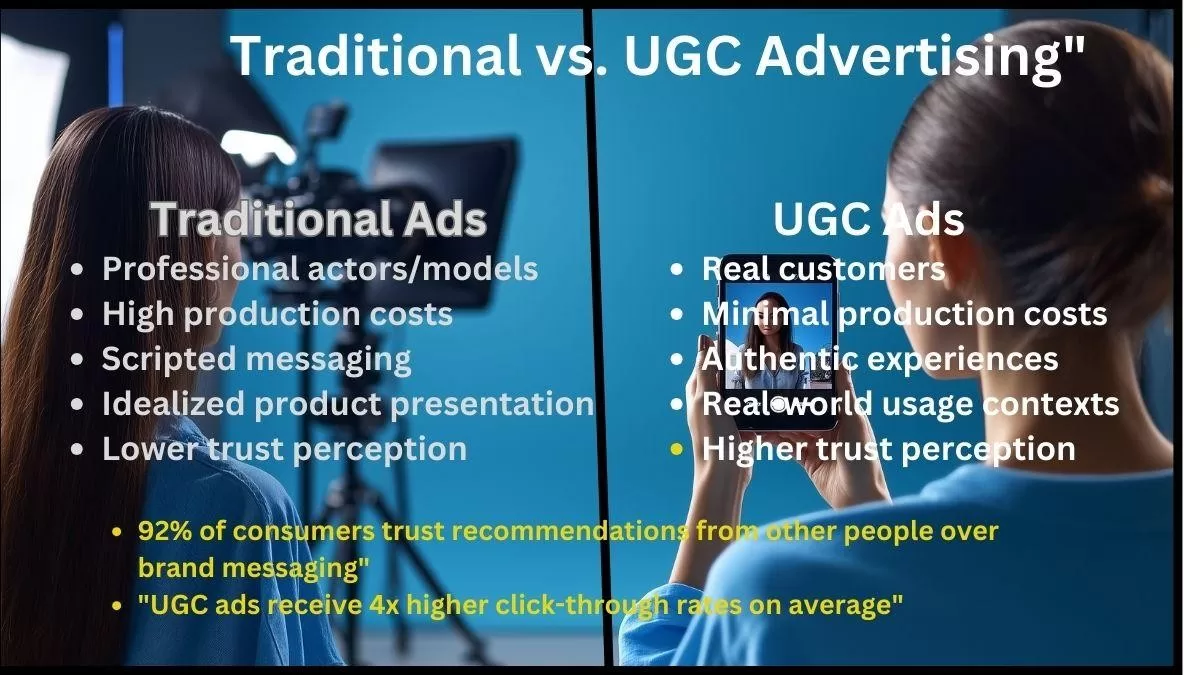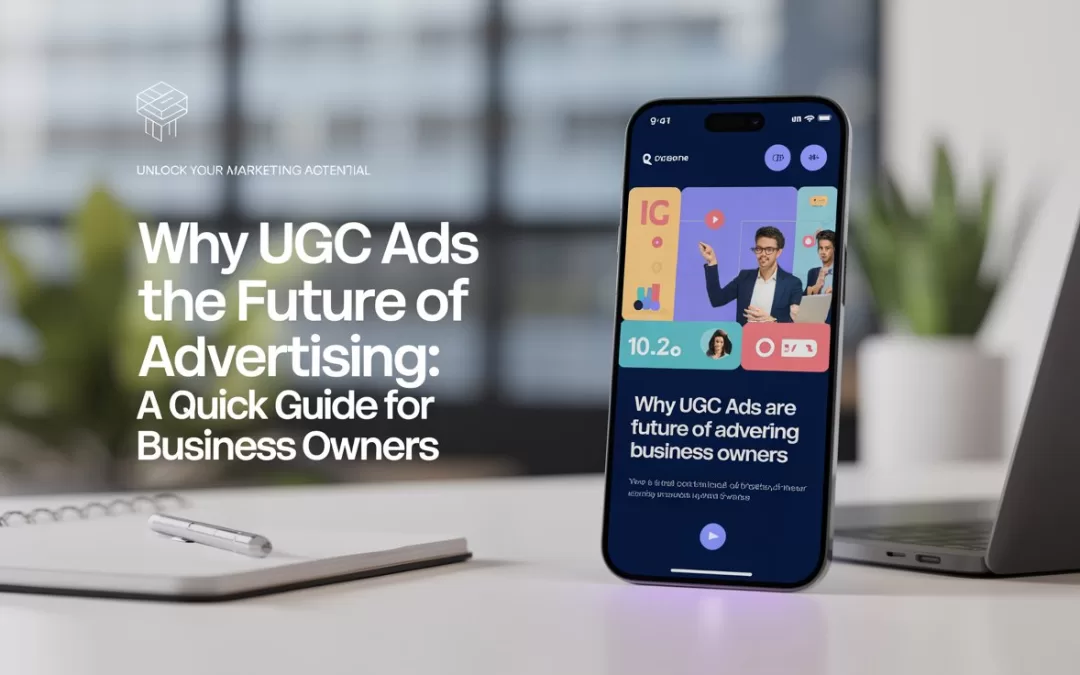In today’s digital marketing landscape, consumers have grown increasingly skeptical of traditional advertising. Enter User-Generated Content (UGC) ads—a more authentic and trustworthy alternative that’s revolutionizing how businesses connect with their audiences.
What Are UGC Ads?
UGC ads are marketing materials that showcase content created by real customers or users rather than professional agencies or in-house teams. This includes:
- Customer reviews and testimonials
- Social media posts featuring your products
- User-submitted photos and videos
- Customer stories and experiences
Unlike traditional advertising, UGC features actual customers and their genuine experiences, creating authenticity that resonates deeply with potential buyers.
Why UGC Ads Matter for Your Business
1. They Build Trust and Authenticity
When potential customers see real people using and enjoying your products, it creates immediate credibility. According to research, 92% of consumers trust recommendations from other people, even strangers, over brand messaging.
2. They Drive Higher Engagement
UGC consistently outperforms brand-created content:
- Comments increase by an average of 29%
- Social shares rise by approximately 35%
- Click-through rates improve by up to 500%

3. They’re Cost-Effective
UGC dramatically reduces production costs by eliminating the need for expensive photo shoots, professional models, and post-production work. Many successful campaigns are built entirely around content that customers create voluntarily or with minimal incentives.
4. They Improve Conversion Rates
The authenticity of UGC translates directly to better performance:
- Conversion rates increase by up to 29% when UGC is incorporated
- 79% of consumers say UGC significantly impacts their purchasing decisions
How to Create Effective UGC Ads: A 4-Step Action Plan
Step 1: Encourage Customer Content Creation
Create Branded Hashtags
Create unique and memorable hashtags that customers can use when sharing content about your products. Example: Airbnb’s #AirbnbExperience has generated millions of posts.
Run UGC Contests
Host competitions that incentivize customers to share their experiences, like GoPro’s regular photo and video contests.
Offer Simple Incentives
Even small rewards like a 5-10% discount on future purchases can significantly increase review submissions and other UGC.
Step 2: Curate High-Quality Content
Not all user content will meet your marketing standards. Implement a strategic curation process:
- Prioritize authentic experiences over staged content
- Select the UGC that aligns with your current campaigns and seasonal themes
- Ensure you feature a diverse range of customers
Step 3: Thoughtfully Edit and Optimize
Even great UGC often benefits from light enhancement:
- Edit with a light touch—polish without eliminating authenticity
- Add your branding, captions, or calls-to-action
- Format content for different platforms (Instagram, Facebook, TikTok, etc.)
Step 4: Handle Legal Considerations
Protect both your brand and content creators:
- Always obtain explicit permission before using anyone’s content
- Create clear terms and conditions for UGC submission and usage
- Properly credit creators when using their content
Best Practices That Drive Results
Keep It Authentic
The power of UGC lies in its authenticity. Resist the urge to over-polish—studies show that slightly imperfect content often performs better because it feels more trustworthy.
Focus on Storytelling
Encourage users to share their journey—the problem they faced, how your product helped, and the positive outcome they experienced.
Test Different Formats
Experiment with various UGC formats:
- Before-and-after photos
- Day-in-the-life videos
- Tutorial content
- Unboxing experiences
Success Stories: Brands Winning With UGC
Aerie: #AerieREAL Campaign
Aerie encourages customers to share unretouched photos in their products, generating abundant UGC while positioning the brand as a champion of body positivity. The result? A 9% sales increase following the campaign launch.
Apple: “Shot on iPhone”
This campaign features stunning photographs taken by iPhone users, simultaneously showcasing the product’s capabilities, generating endless content at minimal cost, and creating a community among users.
Glossier: Built on UGC
Beauty brand Glossier has built much of its marketing strategy around customer content rather than professional models. This approach has helped them grow into a billion-dollar company with exceptional customer loyalty.
Tools to Help You Get Started
UGC Platforms
- TINT: Comprehensive UGC platform for discovering, curating, and displaying user content
- Stackla: AI-powered platform for managing authentic customer content
- Bazaarvoice: Specializes in ratings, reviews, and visual UGC management
Content Management Tools
- Later: Social media management with UGC discovery features
- Taggbox: UGC collection and display platform for websites
- Foursixty: Makes Instagram content shoppable for e-commerce brands
Overcoming Common Challenges
Quality Concerns
Create clear guidelines and examples of ideal submissions, then implement a thorough review process.
Permission Issues
Develop a streamlined permission request system and clear terms for UGC submissions.
Brand Consistency
Provide direction through contest prompts or submission guidelines while maintaining the authentic spirit of UGC.
Action Checklist for Implementation
- [ ] Define your UGC goals and strategy
- [ ] Create branded hashtags and submission guidelines
- [ ] Develop a legal framework for permissions
- [ ] Implement a content curation process
- [ ] Test UGC in various marketing channels
- [ ] Regularly recognize and reward contributors
Conclusion
UGC ads represent the future of advertising because they address modern consumers’ desire for authenticity and genuine experiences. By transforming your customers into brand advocates and content creators, you not only reduce advertising costs but also build deeper connections with your audience.
Start small, experiment continuously, and watch as your customers become your most effective marketing asset.



